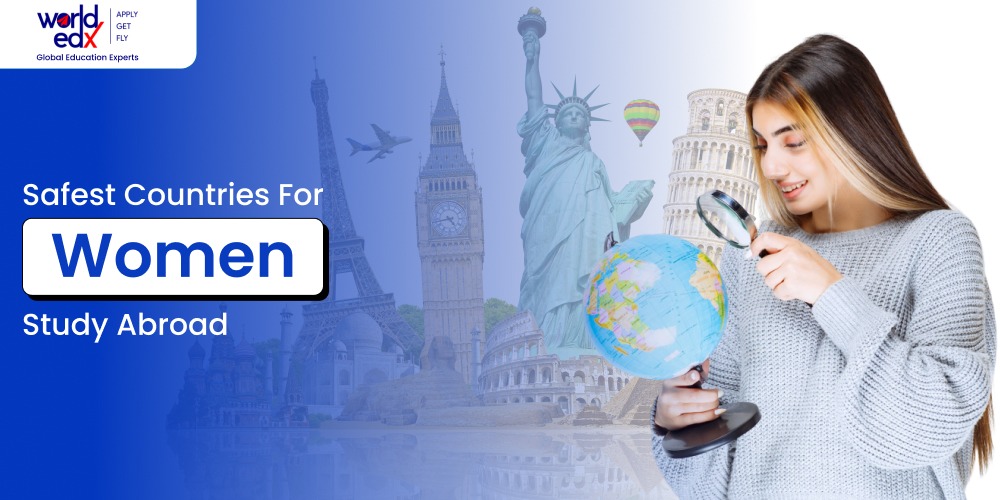Studying abroad is a dream for many, but for women, safety is often a top concern. Beginning on a journey of education in a foreign land can be both thrilling and challenging. Selecting a country with a strong commitment to gender equality, low crime rates and a supportive environment is essential for a fulfilling academic and personal journey. In this exploration, we go deep into some of the safest countries for women to study abroad, where educational objectives are complemented by a secure and empowering atmosphere.
Top 6 Safest Countries For Women to Study Abroad

Ireland
Ireland, a gem in the Global Peace Index 2025, emerges as a land of serenity for women pursuing higher education. With a commitment to global peace evident in its ranking, Ireland offers women students not only a world-class education but also a secure and welcoming environment. The country’s low crime rates and emphasis on community well-being create an ideal setting for academic pursuits. The blend of traditional Irish warmth and a modern educational system creates an atmosphere where women can pursue their studies with confidence, surrounded by the calmness of emerald landscapes.
For instance, in the city of Dublin, which is home to many international students, the local police force, known as An Garda Síochána, has implemented community engagement initiatives to enhance safety.
New Zealand
New Zealand, known for its breathtaking landscapes, also shines as one of the safest countries for women students. The country’s high peace ranking reflects a commitment to providing a secure environment, allowing students to focus on their studies. New Zealand offers a balanced combination of academic achievement and personal security with low crime rates. The country’s unique combination of academic excellence and natural beauty makes it an attractive destination for those seeking not only educational enrichment but also a serene and secure place to pursue their studies. The Kiwi culture values equality, making it an ideal destination for those seeking an enriching academic and personal experience.
For instance, cities like Wellington and Auckland have well-established safety measures. The “Safe Student City” initiative in Auckland collaborates with universities and local authorities to enhance safety, providing resources like the ‘Safey app.’
Canada

This vast and diverse nation welcomes international students with open arms. Ranked 11th in the Global Peace Index, Canada offers a low crime rate, excellent healthcare and a strong commitment to social justice. The nation’s reputation for politeness and friendliness creates a welcoming environment for international students. Whether navigating the vibrant cities or exploring the natural wonders, scholars in Canada find themselves surrounded by an atmosphere that prioritizes both academic superiority and safety. Additionally, cities like Toronto and Vancouver boast low crime rates, contributing to a sense of security for women pursuing higher education in this scenic country.
The University of British Columbia in Vancouver, for example, emphasizes women’s safety through resources like the “AMS Safewalk” program which provides a safe escort service.
Germany
German society places a strong emphasis on gender equality, fostering an environment where women are respected and valued. German universities are known for their commitment to providing a safe learning environment, offering support services and resources to address the specific needs of female students. With its combination of legal safeguards, societal values, and institutional support, Germany stands as a secure and empowering destination for women seeking a transformative study abroad experience. The public transportation system is reliable and safe, contributing to hassle-free travel for women navigating cities. Women studying in Germany can immerse themselves in a rich cultural and educational experience and ensure that their safety is a top priority in this industrious and progressive nation.
In Berlin, for instance, initiatives like the ‘Security Partnership’ program focus on creating safe public spaces, contributing to the overall well-being of residents and students alike.
Australia
Australia, with its sun-kissed landscapes and vibrant cities, ranks prominently in the Global Peace Index. It stands out as a remarkably safe and inviting destination for women studying abroad. The country’s stringent legal system and strict laws against harassment contribute to a protective framework. The efficient public transportation system, well-maintained public spaces and a high-quality healthcare system further contribute to the overall safety of women studying in Australia. Australian universities actively promote gender equality and cities like Melbourne and Sydney consistently rank high for safety.
Cities like Sydney implement initiatives such as ‘Safer Sydney’ to enhance public safety, ensuring a secure environment for residents and students. Leading institutions like the University of Melbourne prioritize women’s safety through support services and awareness campaigns, fostering a sense of security on campus.
United Kingdom

The United Kingdom is widely recognized as a secure and welcoming destination for women pursuing studies abroad. Universities in the UK prioritize student safety, offering dedicated support services and well-monitored campuses. The UK maintains a low crime rate in comparison to many countries, ensuring a safe environment for residents and international students alike. The cultural diversity of the UK fosters an inclusive atmosphere, where women from various backgrounds feel accepted and respected. Government initiatives actively promote the safety of international students, further emphasizing the commitment to providing a secure environment.
Cities like London implement initiatives such as “Project Guardian” focusing on combatting sexual harassment on public transport and enhancing overall safety for women.
Talk to an expert for FREE Counselling
Tips for Staying Safe While Studying Abroad
Research Your Surroundings
- Investigate the safety reputation of your destination.
- Familiarize yourself with local emergency services and potential risks.
Stay Informed on Local Laws
- Understand the legal landscape and cultural norms.
- Save essential contacts, including emergency numbers and embassy details.
Choose Secure Accommodations
- Opt for recommended accommodations in safe neighborhoods.
- Prioritize secure access and well-reviewed housing options.
Maintain Communication
- Stay connected with friends, family, and fellow students.
- Share travel plans and check in regularly.
Guard Personal Information
- Be alert while sharing personal details with strangers.
- Protect information about your residence, schedule, and finances.
Use Reliable Transportation
- Opt for official and reputable transportation services.
- Plan routes ahead and be aware of schedules.
Prioritize Health
- Understand local healthcare options.
- Carry necessary medications and have access to medical support.
Emergency Preparedness
- Know evacuation routes and emergency procedures.
- Stay informed about local weather conditions.
Conclusion
Selecting a country to study abroad is a significant decision and for women, safety is a paramount consideration. The countries mentioned above stand out as some of the safest destinations, offering a conducive environment for female students to thrive academically and personally. Each of these nations not only prioritizes safety but also embraces diversity, ensuring that women from all backgrounds feel welcome and supported in their educational journey.
FAQs
What should I pack beyond clothes and books as Safety Gear Essentials?
Pack practical items like a first-aid kit, copies of important documents, and pepper spray (where legal). Consider a personal GPS tracker for extra security. Remember, being prepared is key to handling unexpected situations with confidence.
What role do cultural adaptability and language proficiency play in staying safe abroad?
Being culturally adaptable helps in understanding and respecting local customs. Basic language proficiency can be beneficial in navigating daily life and seeking assistance in emergencies.
What transportation options are the safest for female students in foreign countries?
Opt for reputable and official transportation services. Plan routes in advance, share your travel plans with someone you trust, and avoid accepting rides from unfamiliar individuals.
What safety precautions should women take when studying abroad in these countries?
Women should be cautious with personal information, stay connected with friends and family, and familiarize themselves with local emergency procedures to enhance their safety.
Is healthcare accessible for international female students?
Yes, in most countries, international students have access to healthcare services. It’s important to understand the local healthcare system, carry necessary medications and invest in comprehensive travel insurance.
How can female students establish a network for support while abroad?
Stay connected with peers, join student groups, and participate in university activities. This network provides a support system and valuable information about local safety measures.







